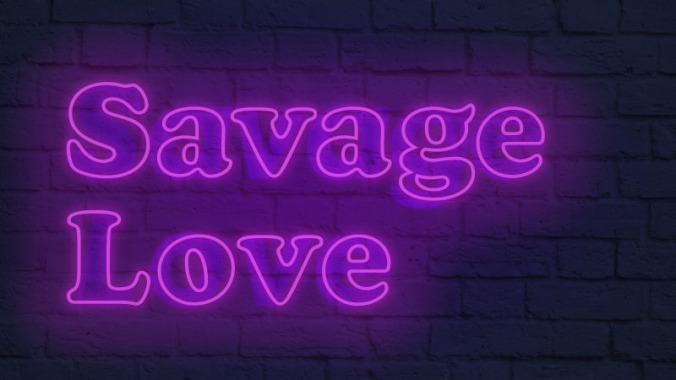This week in Savage Love: Boundaries

My son has always liked handcuffs and tying people up as a form of play. He is 12 now, and the delight he finds in cuffing has not faded along with his love of Legos. He lobbied hard to be allowed to buy a hefty pair of handcuffs. We cautioned him strongly about consent—he has a younger brother—and he has been good about it. In the last year, though, I found out that he is cuffing himself while alone in the house—and when discovered, he becomes embarrassed and insists it’s a joke. I found him asleep one night with his wrists cuffed. I removed the cuffs and spoke to him the next morning about safety. Then recently, when returning home late, I saw him (through his window, from the back of the house) naked and cuffed with a leather belt around his waist, which seemed attached to the cuffs. This escalation was scarier. I haven’t spoken to him about it. My concern about the bondage stuff is that there are some risks (like escaping a fire), particularly if he gets more adventurous (restricting breathing, etc.). This is something he is doing secretly and alone. He is a smart kid, an athlete, and a fairly conscientious scholar. He has friends but sometimes feels lonely. He is going through puberty with its attendant madness—defiance, surliness, etc.—but he is also very loving and kind. He is also quite boastful, which I interpret as insecurity. I can’t help feeling that this bondage stuff is related to these issues, and I worry about self-esteem and self-loathing. We are considering getting him some help. Any advice for us?
Completely Understandable Fears For Son
When a concerned parent reaches out to an advice columnist with a question like yours, CUFFS, the columnist is supposed to call in the child psychologists. But I thought it might be more interesting—I actually thought it might be more helpful—if I shared your letter with a different class of experts: adult men who were tying themselves up when they were 12 years old.
“This boy sounds a lot like how I was at his age,” said James “Jimmy” Woelfel, a bondage porn star with a huge online following. “I want to reassure CUFFS that the discovery of things like this, even at a young age, is extremely common. We may not know why we like this stuff at the time, we just know we do.”
Jimmy is correct: Many adults who are into bondage, heavy or otherwise, became aware of their bondage kinks at a very early age.
“The vast majority of BDSM practitioners report that their sexual interests developed relatively early in life, specifically before the age of 25,” Dr. Justin Lehmiller wrote in a recent post on his invaluable Sex and Psychology blog. “Further, a minority of these folks (7–12% across studies) report that their interests actually developed around the time of puberty (ages 10–12), which is when other traditional aspects of sexual orientation develop (e.g., attraction based on sex/gender).”
While an obsession with handcuffs at age 6 isn’t proof a kid is going to grow up with an erotic interest in bondage—lots of kids like to play cops and robbers—a boy who’s cuffing himself in the throes of puberty and doing so in the nude and in secret… yeah, that boy is almost certainly going to be into bondage when he grows up. And that boy is also going to be embarrassed when his parents discover him in handcuffs for the exact same reason a boy is going to be embarrassed when his parents walk in on him masturbating—because he’s having a private sexual experience that he really doesn’t want to discuss with his parents.
As for your son’s insecurities and loneliness, CUFFS, they may not be related to his interest in bondage at all. They’re more likely a reaction to the shame he feels about his kinks than to the kinks themselves. (And aren’t most 12-year-olds, handcuff obsession or no, insecure?)
“People do bondage for various reasons,” said Trikoot, a self-described “bondage fanatic” and occasional kink educator from Helsinki, Finland. “It’s not always sexual, and it’s almost never a symptom of self-loathing—and a counselor will not ‘erase’ a taste for bondage. Too many kinksters had young lives full of shame and hiding, only to accept themselves years later and then discover what they’ve missed out on.”
In other words, CUFFS, parents and counselors can’t talk a child out of his kinks any more than they can talk a child out of his sexual orientation. This stuff is hardwired. And once someone accepts his kinks, whatever anxiety he feels about them eventually evaporates.
 Keep scrolling for more great stories.
Keep scrolling for more great stories.
